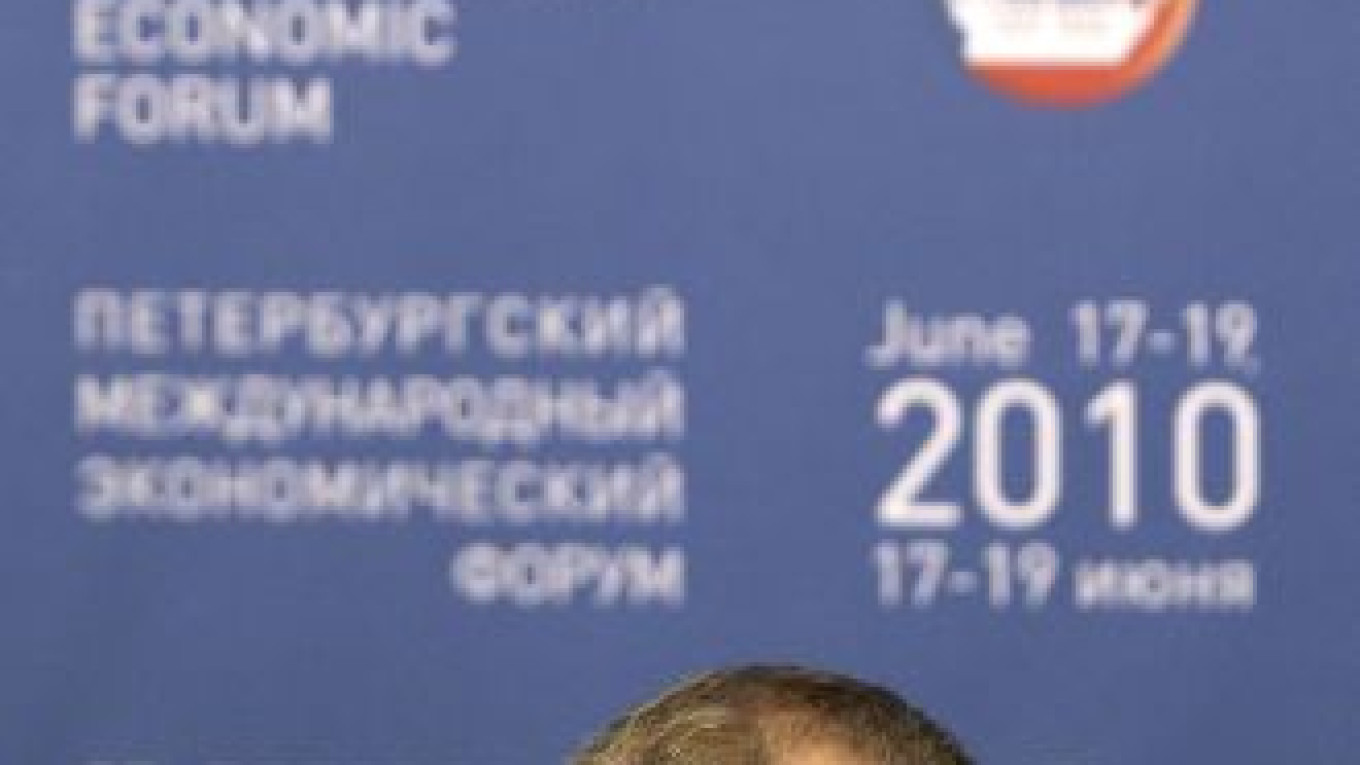ST. PETERSBURG — Igor Sechin's soft tones and courteous manner belie his fearsome reputation.
Ambassadors and officials regard Sechin, a former Soviet military interpreter, as the informal leader of the siloviki clan of nationalist, ex-military and security service officers fighting to maintain a big state role in the economy.
Gatekeeper for Vladimir Putin during his 2000-08 presidency, Sechin is now a deputy prime minister overseeing Russia's vast energy and metals sectors, the world's biggest.
Oligarchs snap to attention in his presence, and Forbes magazine ranks Sechin among the world's top-50 most powerful people, one notch above President Dmitry Medvedev.
The role has brought unaccustomed public attention to a man more comfortable with life in the shadows, and Sechin, 49, used a rare interview during the St. Petersburg International Economic Forum to try to soften his intimidating reputation.
"This seems to me to be something from the realm of legends and myth," he said when asked during the 90-minute conversation whether he was indeed the leader of the Kremlin siloviki. "It's not serious, just not serious to hang a label on someone."
So how would Sechin like to be described?
"A normal citizen should be a patriot of his country," he replied. "A decent person, professional if you work in the government, and effective. That's all."
Many U.S. senators and congressmen have a military background, he added, and they are never described as siloviki.
Sechin bristled at the notion that his background, political alliances and duties running Russia's oil and gas industry put him at odds with Medvedev's vision of Russia as a modern, democratic, pro-Western knowledge economy.
"The president is talking about the risks [of an oil-based economy]. He is not saying we should move away from using natural resources — that is already a given, the foundation of the Russian economy," Sechin explained.
Medvedev, he continued, is right to want to reduce the role of the state in the economy "but we need to sell the share efficiently." He cited the IPO of the state oil giant he chairs, Rosneft, as an example of how to do this.
Although it was "bad" that oligarchs got their hands on highly lucrative natural resource assets for almost nothing during Russia's chaotic sell-offs in the 1990s, Sechin said: "What has happened has happened. Privatization took place. We do not intend to revise privatizations, but we hope … that these assets will be used effectively."
Sechin has been especially active recently in Latin America, traveling to Venezuela to help negotiate arms sales and oil industry partnerships and rebuilding Moscow's Soviet-era trade and finance links with Cuba.
How do his deals with Washington's main foes in Latin America fit with Medvedev's policy of showing a friendly face to the West and boosting relations with Washington?
"It's nothing personal," Sechin replied smoothly. He said socialist Venezuelan leader Hugo Chavez was a "natural partner" for Russia because the two nations have common interests.
As for $4 billion of arms sales to Venezuela, "all countries with high industrial production potential do this," and if Moscow does not supply Caracas with weapons, then someone else will. "Why do we need to refuse?"
A long-term Kremlin insider, Sechin was especially cautious when pressed on Russia's 2012 presidential election.
Many insiders expect Putin, now prime minister, to return to the presidency — but they do not rule out a continuation of the current "tandem" structure with Medvedev in the Kremlin and Putin running the country as prime minister.
Could Sechin be a third candidate?
"I have never heard a more interesting question," he said caustically. "At least not from the realms of fairy tales and fantasy."
The question proves so sensitive that his spokesman called back hours later asking to suggest another response on a possible Sechin presidential candidature: "This is not possible for objective and subjective reasons."
Sechin, who began his association with Putin when the two men worked together in the St. Petersburg City Hall in the early 1990s, said he was surprised to have been invited to work in Moscow's corridors of power on Red Square.
"I somehow unexpectedly ended up in the Kremlin," he said. "There is a special feeling there that this place is holy and deeply significant. There is a very good aura there."
A Message from The Moscow Times:
Dear readers,
We are facing unprecedented challenges. Russia's Prosecutor General's Office has designated The Moscow Times as an "undesirable" organization, criminalizing our work and putting our staff at risk of prosecution. This follows our earlier unjust labeling as a "foreign agent."
These actions are direct attempts to silence independent journalism in Russia. The authorities claim our work "discredits the decisions of the Russian leadership." We see things differently: we strive to provide accurate, unbiased reporting on Russia.
We, the journalists of The Moscow Times, refuse to be silenced. But to continue our work, we need your help.
Your support, no matter how small, makes a world of difference. If you can, please support us monthly starting from just $2. It's quick to set up, and every contribution makes a significant impact.
By supporting The Moscow Times, you're defending open, independent journalism in the face of repression. Thank you for standing with us.
Remind me later.


